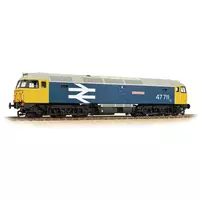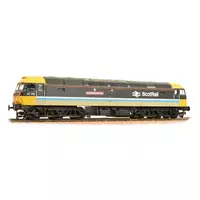Manufacturer catalogue image - please note that pre-release images may be CAD renders or CGI images rather than photographs
Prototype Eras
Era 7 (1972 to 1982) British Rail Blue (TOPS)
Era 8 (1983 to 1994) British Rail Sectorisation
Manufacturer description
Class 47/7 47711 ‘Greyfriars Bobby’ BR Blue (Large Logo)
Built: 1962 -1968
Constructed by: Brush Traction & BR Crewe Works
Duties: mixed traffic
Highlights
• Illuminated head-code panels
• Several body detail variants relevant to each locomotive modelled
• Sprung buffers
• Switchable cab and tail lights
• Driver figure fitted
• Etched name-plates
History
Towards the end of the 1950s, British Railways began planning a second generation of diesel locomotives. After investigating several prototypes, BR decided to place an order with Brush Engineering for 20 locomotives during February 1961. The resulting design became the iconic Brush Type 4 Diesel locomotive, a practical, versatile design with a very distinctive cab. Powered with a Sulzer engine and initially rated at 2750hp, the locomotive could achieve a top speed of 75mph with a tractive effort of 55000lb. Building commenced in January 1962 and the first locomotive D1500 appeared in late September of the same year with test runs on the London Midland Region and Western Region. The design was a success and BR went on to order a total of 512 with continuous production through to early 1967, forming the largest single class of main-line diesel locomotives in the UK.
During this time and subsequent years, several variations appeared with an increase in speed and tractive effort to 95mph and 62000lb respectively. Originally fitted with four character train head-codes, these changed to marker lights, with the addition of high intensity lights and roof aerials in the late 1980s. Other variations involved the fitting of different types of steam heating boiler for early BR coaching stock, later replaced with electric train heating for use with modern rolling stock. The numbering system started with four figures but changed to five with the introduction of the TOPs coding system which saw the locomotives classified as Class 47 Diesels with variations such as 47/0, 47/2, 47/3, 47/4 and 47/7. By the end of the 1990s, half of the Class 47 fleet had been withdrawn or scrapped, 33 have been converted into Class 57 locomotives and several have been preserved, including the original D1500, now numbered 47401.
This model faithfully represents one of the popular ‘shove Duffs’ that was modified for push-pull operation on the Scottish Region in the late 1970s, and as such is ideally twinned with the Branchline Mk2F ScotRail DBSO.
Catalogue listing
Model details
Prototype information
* Class names often change over the lifespan of a locomotive, so this is not necessarily the class name used by the operator in the period modelled.
Supplier links are provided for your convenience and do not guarantee that the product is currently available. RailwayModels.uk is not a representative of these suppliers, but may receive a commission when purchases are made through links on this page.


